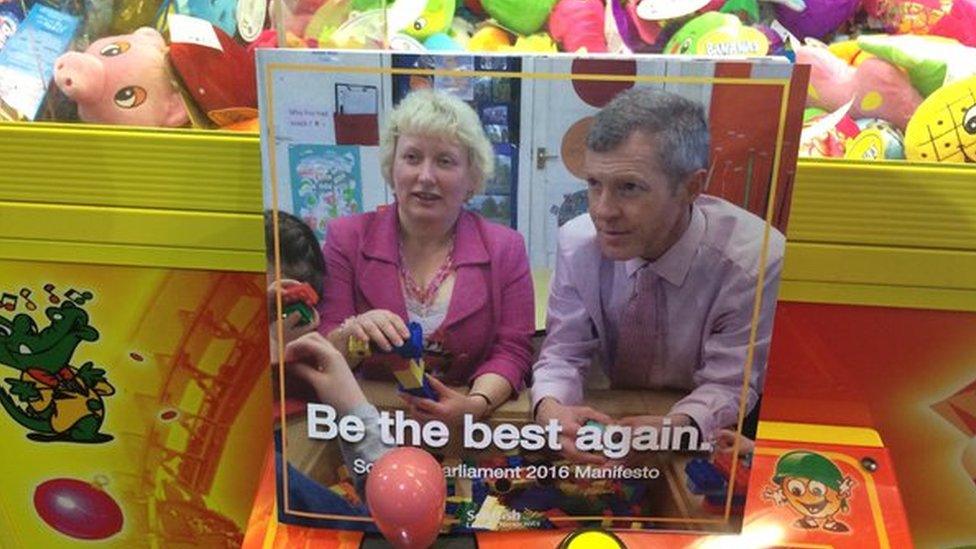Holyrood 2016: Fun on Friday with the Liberal Democrats
- Published

Willie Rennie launched the Lib Dem manifesto at a soft play centre in Edinburgh
Here's a game for a Friday. Loadsafun to play at home. Which animals do our party leaders most resemble?
Now, I'll leave it to you. There is, incidentally, no prize. (Who said "bit like United's season"? That was cheap and underhand.)
However, let me start the game by comparing Willie Rennie with Tigger. You know. Character from A.A. Milne's oeuvre? Immortalised by Disney? Fond of bouncing? That's the one.
I think the comparison is apt. Despite the slight drawback that Tigger is fictional, I think the link is a perfect fit. Whatever setback occurs, Tigger is relentlessly and permanently enthusiastic.
Today he bounced into a Leith play area to launch his party's manifesto. Willie, that is, not Tigger. One on-looking aide said with muffled admiration: "We're all knackered and he's ready for the next thing."
Percy Pigs
Now, I essay the animal comparison with caution. Mr Rennie has not had the best of times lately in coping with the bestial world. Remember the pigs at Gorgie City Farm, external?
The Lib Dems obviously do. To commemorate that visit - all of seven days ago - they featured pigs at their launch today. Packets of Percy Pigs, distributed to the wicked media.
For Mr Rennie, these particular porkers had a series of evident advantages over the real thing. They were small, sweet - and, above all, stationary.

Mr Rennie was all smiles at the manifesto launch event
The other day, at her launch, Ruth Davidson chided her colleagues to "smile until your cheeks ache". Willie Rennie must have exceptionally painful facial pouches. Boy, did he smile.
He grinned as he clambered up the play frame. He laughed as he slid down the chute. He smiled as he confronted the w. media. And he chortled without cessation as members of said w.m. suggested his party might slip behind the Greens in the Holyrood rankings.
Hard work
He attributed this view to three factors. Firstly, he believed voters would reward his party for hard work in the last parliament on issues like police and child care. Punching, as he put it, well above their relatively limited weight.
Secondly, he argued that the shine had come off the SNP, that folk were now readier to join with the Lib Dems in subjecting the Scottish government's record to critical scrutiny.
Thirdly, he suggested that diligent constituency and regional canvassing - spreading the message - would pay dividends. In particular, he said folk were open to the idea of a 1% increase in income tax to fund educational improvements.
More generally, he argued that the tone of the Lib Dem offer matched the public mood.
They would return power to local communities. They would strengthen civil liberties. There was, he argued, a genuine and continuing role for Liberal Democracy in Scottish politics.

Some have suggested Mr Rennie's Lib Dems are paddling uphill in the election campaign
- Published15 April 2016

- Published15 April 2016
